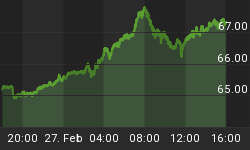With last Mondays market wrap dealing with derivatives, namely interest rate derivatives, I decided that perhaps it would be appropriate to discuss the current interest rate environment a little more 'big picture.
To do so, I thought it would be best to direct everyones attention to a wonderful piece which I was first made aware of through Jim Sinclairs web site. It is titled, Interest Rate Increases Stress the Banking System, and its written by Warren Pollock for a publication called The Macroeconomic Newsletter. In a nutshell, Pollock reasons that that the FED is in a pickle and cannot raise interest rates through the 'meat of the curve [5 - 10 yr.] without 'blowing up the entire [financial] system. He goes on to surmise that - ultimately - the market will raise rates if the FED fails to do so. If you buy into this thesis [which Im secretly jealous I didnt write] there are only two viable courses of action in the near future namely a] the FED raises rates or b] the market raises rates. What got me scratching my head was that both potentially end with systemic financial melt down or as I see it - the loss of U.S. dollar as a viable reserve currency. Consider for a moment the implications of this loss.
 Currency Consternation
Currency Consternation
If Im George Bush in the White House, I [or my team] likely know that the current economic situation is dire and I probably didnt need Paul Volcker to write an Op-Ed piece entitled, On Thin Ice, in the Washington Post to make that point abundantly clear. Thats why Alan Greenspans visits to the White House have become so frequent [they have reportedly quadrupled since the Clinton admin.] - its all high level crisis management.
A dire situation such as the one outlined above would go a long way to explaining massive intervention in markets by the Exchange Stabilization Fund [ESF] or its surrogates in the recent past. It would explain why the FED insists on telling us all there is no inflation. It would explain why PPI, CPI and the price of gold [and silver by extension] had to be hedonically manipulated or 'beaten with a stick, aka rigged. It would also explain why the administration forever sees lower prices just around the corner and why Alan Greenspan continually tries to 'jaw bone the price of oil down. There 'is no inflation because acknowledging it means truly raising interest rates - which means no more conundrums - a severe recession [deflationary collapse, perhaps?] and good-bye dollar. So, its all about a viable currency - at least for now. In this sense, the manipulation of precious metals prices becomes a lead role in a much larger geopolitical play.
Without a viable currency the government would have its profligacy and deficit spending instantaneously 'cut off at the knees. Wars would be next to impossible to finance carte blanche - since foreign capital has arguably [if not factually] been funding them.
 The above discussion invites the obvious question: With the Feds measured approach of raising short term rates [7 times already] a quarter of a point at a time, why havent long term rates backed up more than they have, or in head scratching Greenspan parlance - the apparent conundrum?
The above discussion invites the obvious question: With the Feds measured approach of raising short term rates [7 times already] a quarter of a point at a time, why havent long term rates backed up more than they have, or in head scratching Greenspan parlance - the apparent conundrum?
Cap In Hand
The answer to the question above, I would suggest, is not unlike what happens in the foreign exchange markets when speculators [rightly, perhaps?] bet against the U.S. dollar, namely, Central Banks intervene and inflate the dollars value in the short term, inducing pain and prompting shorts to capitulate and cover. It really is quite a cat and mouse game to watch.
If I wanted to accomplish the same type of maneuver in the interest rate arena, namely punish [or train otherwise] those betting that long term rates would rise, what better tool could there possibly be than a 45 Trillion dollar off balance sheet - largely interest rate derivatives - book to ensure rates remained 'locked low?
In a world where folks like Alan Greenspan go on at length about the size of Fannie and Freddies mortgage books - but remain all but silent about the size [45 Trillion] and growth [2 - 3 Trillion/quarter] of J. P. Morgans derivatives book - I must admit that I find this the most perplexing conundrum of all. Meow.















